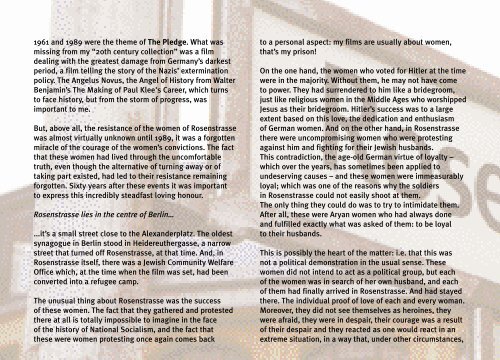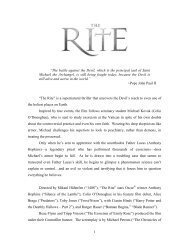ROSENSTRASSE
ROSENSTRASSE
ROSENSTRASSE
Create successful ePaper yourself
Turn your PDF publications into a flip-book with our unique Google optimized e-Paper software.
1961 and 1989 were the theme of The Pledge. What was<br />
missing from my “20th century collection” was a film<br />
dealing with the greatest damage from Germany’s darkest<br />
period, a film telling the story of the Nazis’ extermination<br />
policy. The Angelus Novus, the Angel of History from Walter<br />
Benjamin’s The Making of Paul Klee's Career, which turns<br />
to face history, but from the storm of progress, was<br />
important to me.<br />
But, above all, the resistance of the women of Rosenstrasse<br />
was almost virtually unknown until 1989, it was a forgotten<br />
miracle of the courage of the women’s convictions. The fact<br />
that these women had lived through the uncomfortable<br />
truth, even though the alternative of turning away or of<br />
taking part existed, had led to their resistance remaining<br />
forgotten. Sixty years after these events it was important<br />
to express this incredibly steadfast loving honour.<br />
Rosenstrasse lies in the centre of Berlin…<br />
...it’s a small street close to the Alexanderplatz. The oldest<br />
synagogue in Berlin stood in Heidereuthergasse, a narrow<br />
street that turned off Rosenstrasse, at that time. And, in<br />
Rosenstrasse itself, there was a Jewish Community Welfare<br />
Office which, at the time when the film was set, had been<br />
converted into a refugee camp.<br />
The unusual thing about Rosenstrasse was the success<br />
of these women. The fact that they gathered and protested<br />
there at all is totally impossible to imagine in the face<br />
of the history of National Socialism, and the fact that<br />
these were women protesting once again comes back<br />
to a personal aspect: my films are usually about women,<br />
that’s my prison!<br />
On the one hand, the women who voted for Hitler at the time<br />
were in the majority. Without them, he may not have come<br />
to power. They had surrendered to him like a bridegroom,<br />
just like religious women in the Middle Ages who worshipped<br />
Jesus as their bridegroom. Hitler’s success was to a large<br />
extent based on this love, the dedication and enthusiasm<br />
of German women. And on the other hand, in Rosenstrasse<br />
there were uncompromising women who were protesting<br />
against him and fighting for their Jewish husbands.<br />
This contradiction, the age-old German virtue of loyalty –<br />
which over the years, has sometimes been applied to<br />
undeserving causes – and these women were immeasurably<br />
loyal; which was one of the reasons why the soldiers<br />
in Rosenstrasse could not easily shoot at them.<br />
The only thing they could do was to try to intimidate them.<br />
After all, these were Aryan women who had always done<br />
and fulfilled exactly what was asked of them: to be loyal<br />
to their husbands.<br />
This is possibly the heart of the matter: i.e. that this was<br />
not a political demonstration in the usual sense. These<br />
women did not intend to act as a political group, but each<br />
of the women was in search of her own husband, and each<br />
of them had finally arrived in Rosenstrasse. And had stayed<br />
there. The individual proof of love of each and every woman.<br />
Moreover, they did not see themselves as heroines, they<br />
were afraid, they were in despair, their courage was a result<br />
of their despair and they reacted as one would react in an<br />
extreme situation, in a way that, under other circumstances,
















